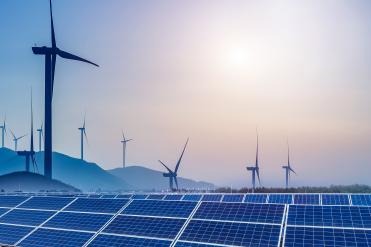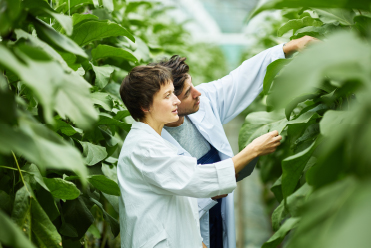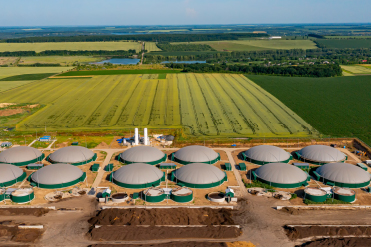High-Level Opening Session
Day 1 - 22 November
14:00 - 15:30 CET - Room CC5
Provided that several key decarbonisation technologies are still at a very early stage of development, what will be the impacts of the shocks from the COVID-19 pandemic and Russia’s war against Ukraine on green innovation? Could mission-oriented innovation approaches accelerate green innovation and help address the consequences of the war? What role can low-carbon hydrogen play in addressing climate change and energy security when several countries have incorporated it into their Recovery Plans? What are the opportunities and trade-offs found in the bio-economy for a sustainable and resilient recovery? How can green innovation in SMEs be supported in the context of high energy prices? High-Level speakers addressed these and related topics to set the scene for the 2022 GGSD Forum.
Master of ceremony:
- Jo Tyndall, Director, Environment Directorate, OECD
Moderator:
- Kerri-Ann Jones, Deputy Secretary-General, OECD
Welcome remarks:
- Mathias Cormann, Secretary-General, OECD
Scene-setting presentation:
- Mariana Mazzucato, Professor, University College London (UCL)
Keynote speeches and panel discussion:
- Stuart Nash, Minister of Economic and Regional Development, Tourism, Small Business and Forestry, New Zealand
- Michaela Spaeth, Ambassador, Permanent Representative to the OECD, Germany
- Javiera Petersen, Undersecretary of Economy and Small Business, Ministry of Economy, Development and Tourism, Chile
- Jens Lundsgaard, Deputy Director, Directorate for Science, Technology and Innovation, OECD
Session 1 - Mission-oriented innovation for a net-zero and energy secure future
Day 1 - 22 November
16:00 - 17:30 CET - Room CC5
The ambitious 2050 net-zero targets adopted by many countries and the even more challenging objectives of weaning-off reliance on Russian oil and gas in a shorter timeframe highlight the limitations of traditional Science, Technology and Innovation (STI) policies. Mission-oriented innovation approaches (MOIAs), which are defined as co-ordinated policy packages designed to address well-defined societal challenges in a specific timeframe, could play an important role in achieving such time-bounded objectives. What are the lessons learnt from COVID-19 recovery measures for mission-oriented green innovation? How can mission-oriented approaches accelerate cost reductions of high-risk and high-reward research in clean energy? This session focused on the implications of the recent economic shocks for the design and implementation of mission-oriented innovation policies to address societal environmental challenges.
Moderator:
- Yongsuk Jang, Senior Research Fellow, Science and Technology Policy Institute (STEPI); Chair, OECD Committee for Scientific and Technological Policy
Scene-Setter:
- Ann Mettler, Vice-President for Europe, Breakthrough Energy
Panellists:
- Matthias Weber, Head of Center for Innovation Systems & Policy, Austrian Institute of Technology
- Göran Marklund, Deputy Director General, Vinnova, Sweden and Chair, OECD Working Group on Innovation and Technology
- Jennifer Gerbi, Acting Director, Advanced Research Projects Agency-Energy (ARPA-E), US Department of Energ, USA
- Philippe Larrue, Policy Analyst, Science and Technology Policy Division, OECD
Policy questions
- What is the expected impact of COVID-19 recovery measures and high energy prices on green innovation and the net-zero emission targets?
- How can mission-oriented innovation policy approaches (or MOIAs) help governments balance and connect the support to the deployment of available technologies and to break-through innovation? And to accelerate high-risk and high-reward research in green technologies?
- What governance mechanisms can ensure the coordination required for the successful implementation of mission-oriented approaches?
- What are the implications of MOIAs for the behavioural and social changes needed for the transition to Net Zero?
Session 2 - Innovation in bio-economy sectors for a circular economy
Day 2 - 23 November
09:30 - 11:00 CET - Room CC5
The bio-economy, generally defined as economic activities based primarily on biogenic instead of fossil resources, offers potential solutions for developing materials that are easier to recycle and reuse. However, potential sustainability trade-offs due to land and water use and impacts on biodiversity need to be addressed. What would be the impact of the larger use of bio-materials and bio-energy on the environment? To what extent bio-materials and bio-energy can help to reduce dependence on Russian oil and gas? Which types of policies would help to spur technological development and how these might differ across countries due to differences in the types of biomass and structure of biomass-utilising industries? This session focused on the opportunities and trade-offs that the bio-economy could play for a sustainable and resilient recovery.
Moderator:
- Christian Patermann, Former Director EU Commission and Advisor to the German Government on bio-economy matters
Scene-setter:
- Mary Maxon, Executive Director, BioFutures, Schmidt Futures, United States
Panellists:
- Ole Jørgen Marvik, Special Advisor for Life Sciences, Innovation Norway; Delegate OECD Working Party on Biotechnology, Nanotechnology and Converging Technologies (WPBNCT)
- Giulia Gregori, Head of Strategic Planning and Institutional Communication, Novamont, Italy
- Gernot Klepper, Chairman, ISCC System (International Sustainability & Carbon Certification)
- Marta Gomez San Juan, Senior Expert Circular Bioeconomy, Office of Climate Change, Biodiversity and Environment, Food and Agriculture Organisation (FAO)
Policy questions
- How can bio-materials support the transition to a circular and resilient economy? What are the implications for the 2030 Sustainable Development Agenda objectives, including on responsible consumption and production (SDG 12), climate action (SDG 13), and protecting life on land (SDG 15)?
- What policies can promote innovation and adoption of bio-materials? How do the differences in the types of biomasses and biomass-utilising industries across countries affect innovation policy design?
- What governance and monitoring mechanisms can increase the coherence of bio-economy strategies (which are inherently multi-sectoral), avoid over-exploitation of bio-mass resources, and ensure they contribute to the green low-carbon transition?
Session 3 - International co-operation to accelerate green technology innovation and transfer
Day 2 - 23 November
11:20 - 12:50 CET - Room CC5
International Science, Technology and Innovation (STI) collaboration and innovative open science approach underpinned the international response that contributed to the development of COVID-19 vaccines and therapies. International STI co-operation could also help address global environmental challenges, such as climate change and biodiversity loss, by pooling limited domestic STI resources, promoting knowledge exchange, and diffusion of green technologies. What are the incentives for international cooperation and the possible cost-sharing mechanisms? Could Russia’s war against Ukraine result in a more fragmented international green STI landscape? How to balance the need for global deployment of new technologies and private returns on investment? How could these international efforts be financed, and what is the role of “blended finance” to this end? This session discussed the challenges and opportunities that international collaboration creates for green innovation, and the key lessons learnt from international STI collaboration efforts to address the COVID-19 pandemic.
Moderator:
- Jens Lundsgaard, Deputy Director, Directorate for Science, Technology and Innovation, OECD
Scene-setter:
- Alessandra Colecchia, Head of Division, Science and Technology Policy Division, Directorate for Science, Technology and Innovation, OECD
- David Elvira-Martinez, Head of Global Corporate Public Policy, Sanofi
Panellists:
- Joanna Drake, Deputy Director-General, Directorate General for Research and Innovation of the European Commission
- Amy Dietterich, Director of the Global Challenges Division, World Intellectual Property Organization (WIPO)
- John-Arne Røttingen, Ambassador for Global Health, Ministry of Foreign Affairs, Norway
- Xiaojun Grace Wang, Director, Ad Interim (a.i), UN Office for South-South Cooperation (UNOSSC)
Policy questions
- What are the challenges, benefits and best practises for international cooperation on green innovation?
- What are the key lessons learnt from international collaboration on COVID-19 research, and could these be applied to enhance cooperation on climate change and other key environmental challenges? What impacts, if any, is the war in Ukraine having on international collaboration on green innovation
- Which mechanisms are proving effective to accelerate the global deployment of low-carbon technologies, and how could these be improved?
Session 4 - Stimulating green innovation in SMEs
Day 2 - 23 November
14:00 - 15:30 CET - Room CC5
Small businesses, albeit often having a limited environmental impact individually, contribute in aggregate terms up to 60-70 percent of total industrial pollution. Furthermore, innovative small companies and start-ups can play a key role in the development of new technologies and business models for the green transition. However, the debts accumulated during the pandemic, the traditional barriers to SMEs’ uptake of green technologies, and high energy prices are likely to constrain research into and adoption of green technologies by SMEs. What policies can help new and existing SMEs overcome the barriers to going green? What are the best practises to support and finance green start-ups? How countries should redesign recovery measures and long-term sustainability strategies, given the renewed pressure on SMEs generated by high energy prices? This session took stock of the specific measures to support SMEs in national recovery plans, and discussed drivers of and barriers to green innovation in SMEs in the context of high energy prices.
Moderator:
- Martin Godel, Head of Small and Medium Size Enterprise Policy Division, State Secretariat for Economic Affairs, Switzerland and Chair of OECD Committee on SME's and Entrepreneurship (CSMEE)
Scene-setter:
- Céline Kauffmann, Head of the SME and Entrepreneurship Division, OECD
Panellists:
- Trond Moe, Managing Director, Nordic Environment Finance Corporation (NEFCO)
- Pamela Jouven, Director, SME Climate Hub, United Kingdom
- Véronique Willems, Secretary General, SMEunited
- Arvinder Kainth, Industrial Technology Advisor, National Research Council, Canada
Policy questions
- What are the implications of the COVID-19 pandemic and current high-energy prices for the diffusion of greener technologies and business practises in SMEs? And for the creation of new green start-ups?
- What barriers hold back the greening of SMEs, green entrepreneurship, and the growth of viable green companies? Do existing policy and regulatory frameworks address the specificities of SMEs?
- What role do measures targeting demand for green solutions and those directly supporting entrepreneurs (e.g. green incubators) play in stimulating innovation and growth of green SMEs? And how do they interact?
- How to address the financing barriers that often hinder the development of green SMEs? How to scale-up successful firms?
Session 5 - A new push for hydrogen
Day 2 - 23 November
16:00 - 17:30 CET - Room CC5
Government support for the development of low-carbon hydrogen features in the recovery plans of several countries and it is a key technology in net-zero emission scenarios by 2050. Low-carbon hydrogen could be used as feedstock for heavy industries, fuel for transport vehicles, and as storage for electricity produced from intermittent renewable energy sources. However, several economic and technological barriers hinder its adoption. How to ensure the large availability of cheap renewable electricity needed for the wide adoption of green hydrogen? How does Russia’s large-scale aggression against Ukraine affect the prospects for blue hydrogen? What policies can help to reduce risk and uncertainty for investors in low-carbon hydrogen? This session explored the role of low-carbon hydrogen in the net-zero transition considering the implications of the renewed urgency to decrease dependency on natural gas in many OECD countries.
Moderator:
- Noé van Hulst, Chair, International Partnership for Hydrogen and Fuel Cells in the Economy (IPHE)
Scene-setter:
- Timur Gül, Head of the Energy Technology Policy Division, IEA
Panellists:
- Eiji Ohira, Strategy Architect, Fuel Cell and Hydrogen Technology Office, New Energy and Industrial Technology Development Organization (NEDO), Japan
- Angel Caviedes, Head of New Energies Unit, Ministry of Energy, Chile
- Christelle Werquin, General Delegate, France Hydrogène
- Antoine Dechezleprêtre, Senior Economist, Productivity, Innovation and Entrepreneurship Division, OECD
Policy questions
- What are the benefits, challenges and trade-offs that the different technologies to produce low-carbon hydrogen entail? How does the war in Ukraine affect their prospects?
- What policies, including standards and certification schemes, can de-risk investment in low-carbon hydrogen production? And what is the role of different stakeholders and organisations in developing them?
- What sectors could be the first adopters of low-carbon hydrogen, and how to unlock their demand? What infrastructure is needed for its production, transport and large-scale adoption?
Closing Remarks
Day 2 - 23 November
17:15 - 17:30 CET - Room CC5
The Forum's key findings, identified knowledge gaps and future areas of work for the OECD were provided by Jo Tyndall, Director, Environment Directorate, OECD.







